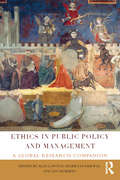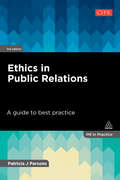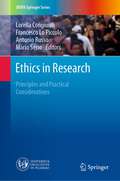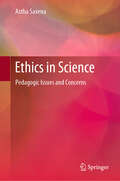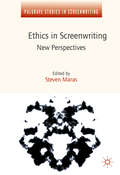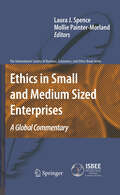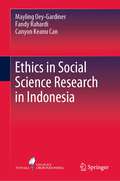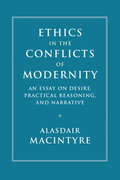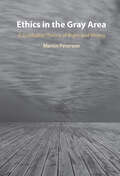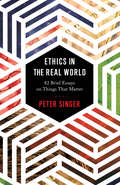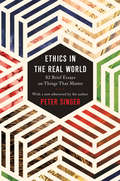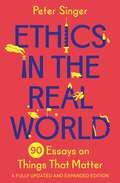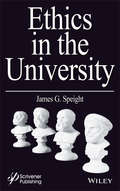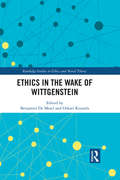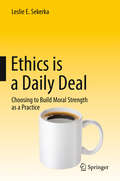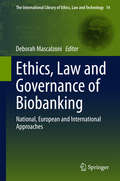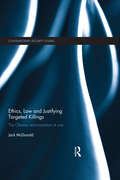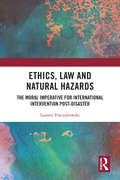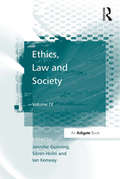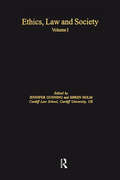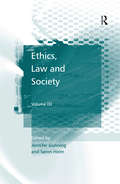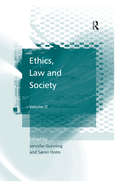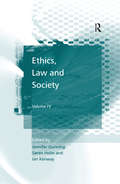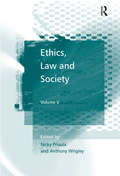- Table View
- List View
Ethics in Public Policy and Management: A global research companion
by Leo Huberts Zeger van der Wal Alan LawtonEthics in Public Policy and Management: A global research companion showcases the latest research from established and newly emerging scholars in the fields of public management and ethics. This collection examines the profound changes of the last 25 years, including the rise of New Public Management, New Public Governance and Public Value; how these have altered practitioners’ delivery of public services; and how academics think about those services. Drawing on research from a broad range of disciplines, Ethics in Public Policy and Management looks to reflect on this changing landscape. With contributions from Asia, Australasia, Europe and the USA, the collection is grouped into five main themes: theorising the practice of ethics; understanding and combating corruption; managing integrity; ethics across boundaries; expanding ethical policy domains. This volume will prove thought-provoking for educators, administrators, policy makers and researchers across the fields of public management, public administration and ethics.
Ethics in Public Relations: A Guide to Best Practice
by Patricia J ParsonsEthical practice in any professional discipline is guided by age-old philosophical perspectives, but its modern parameters are continually evolving. Ongoing developments in technology, social media and social contexts mean that public relations and its practices are constantly changing, and so do the ethical questions faced by practitioners in the field. Ethical questions and dilemmas are inherent to public relations, and ensuring that practitioners operate ethically is fundamental to the professionalism and credibility of the field. Engaging and accessible, Ethics in Public Relations offers a lively exploration of the key ethical concerns present in the public relations world today by way of practical tips and guidance to support those in PR and corporate communications. Written by a leading academic in the field, this fully updated third edition of Ethics in Public Relations includes an entirely new chapter on the uses of ethics in social media, covering topical issues such as blogger engagement and the relationship between employee social media activity and organizational reputation.
Ethics in Research: Principles and Practical Considerations (UNIPA Springer Series)
by Lorella Congiunti Francesco Lo Piccolo Antonio Russo Mario SerioThis book draws a connection between ethics and research across social sciences, philosophy, medical sciences and legal sciences, and demonstrates that any research activity needs to be conducted by means of rules deriving from the field of ethics. Although having a common core, such rules assume different characteristics depending on the branch of science, as the contributions on philosophy, medicine, dentistry, law, biotechnology, robotics and architecture highlight. It also investigates the more complex ethical concerns and places them in a larger, technological context. Starting with an introduction to common-sense ethical principles, the contributions then guide the reader, helping them develop and understand a comprehensive knowledge on the field. Notably, it appeared interesting to analyze recent events related to the arrival of the Sars-CoV-2 pandemic in light of ethical principles, highlighting in what terms their applicability can still be confirmed. Moreover, the book makes these topics accessible to a non-expert audience, while also offering alternative reading pathways to inspire more specialized readers.
Ethics in Science: Pedagogic Issues and Concerns
by Astha SaxenaThe book approaches the subject of ethics in science from a pedagogical and pragmatic viewpoint and addresses the need to effectively deal with these issues in science classrooms at the K-12 and undergraduate levels, drawing on real-world cases to do so. The book also explores ethical issues in connection with recent biotechnological advances and urges the reader to move beyond a disciplinary understanding and adopt an interdisciplinary view of the entire issue.Intended to initiate a process of reflecting on and investigating these ethical issues related to biotechnologies, and to enable the reader to take a personal stance on these issues rather than being led by outside agencies, the book offers a source of in-depth study material for researchers working in this area, as well as a training manual for teachers at both in-service & pre-service level, teacher educators, curriculum designers and professionals working in the field. Combining theory and practice, and including teachers’ reflections on their own pedagogic practice, it offers a valuable resource to help teaching professionals conduct experiments and achieve pedagogic innovations in their own work.“‘Ethics in Science- Pedagogic Issues & Concerns’ is an excellent textbook for high school and college students that provides an overview of the ethical issues in science and technology and includes useful cases studies and questions for discussion. I recommend it highly.”—David B. Resnik, JD, PhD, Bioethicist and IRB Chair, National Institute forEnvironmental Health Sciences, National Institutes of Health, USA“Given the recent proliferation of biological and biomedical knowledge, the need for education in the relationship between science and ethics has become ever increasingly essential. The book by Dr. Saxena provides a valuable introduction on how to inaugurate such an education. This book is an excellent template for those attempting to teach science and ethics.”—Bernard.E.Rollin, University Distinguished Professor,Colorado State University, Colorado, USA“This book by Dr Astha Saxena, a well-qualified educationist, fulfils a need for such a book for students of Science and Technology stream. The coverage is comprehensive and the writing is lucid. I endorse this book as it will bring a criticality of thinking among Indian students.”—Kambadur Muralidhar PhD, FASc, FNASc, FNA,University of Hyderabad, Hyderabad“Science without ethics can lead to false scientific claims as well as unbridled technological growth. The present book conceptualizes this integration of ethics and science beautifully with academic rigour.”—Alka Behari, Professor, Department of Education,University of Delhi, New Delhi, India
Ethics in Screenwriting
by Steven MarasEthics in Screenwriting: New Perspectives is a book that breaks new ground by forging a link between screenwriting research and a burgeoning interest in film, media, and narrative ethics. Going beyond the orthodox discussion of morality of film and television, the collection focuses on ethics in screenwriting. Building on a new wave of screenwriting research, as well as a 'turn to ethics' in humanities and media studies scholarship, this title forms a bridge between these areas in a unique analysis of a key area of media practice. Each essay goes beyond the general discussion of ethics and media to engage with specific aspects of screenwriting or scripting. Written for readers interested in questions of ethics as well as screenwriting, the collection offers new perspectives on ethical questions associated with Writers and their Production Environment; Actuality and History; and Character and Narrative.
Ethics in Small and Medium Sized Enterprises
by Mollie Painter-Morland Laura SpenceThis book is the first of its kind - a global overview of extant research on ethics in small and medium sized enterprises. While vast amounts of corporate money, government policy and media time are directed at the social and ethical activities of large corporations, small businesses don't generally attract the spotlight. This is wildly inappropriate, however, since upward of 90% of private businesses are small or medium sized. This book goes some way to helping us understand the social and ethical contribution of this majority organizational form. The first section of the book is a global round-up of research on ethics in small and medium sized enterprises from major regions of the world. In the second section smaller scale research projects from a variety of countries present both empirical and theoretical advances in the area. Anyone with an interest in ethics and small and medium sized enterprises should find this an inspiring book which paves the way for future research.
Ethics in Social Science Research in Indonesia
by Mayling Oey-Gardiner Fandy Rahardi Canyon Keanu CanThis textbook presents ethical guidelines for conducting research in the social sciences, focused on Indonesia. As a country with a fast-growing research environment, the real-life cases of ethical issues that arise in Indonesia can teach both aspiring and established researchers how to approach the complexity of research ethics and dilemmas. With technological advancement affecting how research is conducted, the necessary ethical guidelines for research are also evolving. The instantaneous nature of information movement has made confidentiality in research data more critical than before, and any negligence in protecting research participants has an unprecedented scope of damage. The methods book synthesises hundreds of worldwide ethical guidelines and past issues that social science researchers will find highly relevant. Arranged chronologically to represent each research stage—from research preparation to post-research—the book prepares researchers to mitigate ethical crises. Relevant to all social scientists, both emerging and established, conducting research in Indonesia, this co-published textbook between Springer and OBOR is also relevant to researchers beyond the archipelago. It is also an indispensable teaching resource for lecturers in research methods and ethics across social science disciplines.
Ethics in the Conflicts of Modernity
by Alasdair MacintyreAlasdair MacIntyre explores some central philosophical, political and moral claims of modernity and argues that a proper understanding of human goods requires a rejection of these claims. In a wide-ranging discussion, he considers how normative and evaluative judgments are to be understood, how desire and practical reasoning are to be characterized, what it is to have adequate self-knowledge, and what part narrative plays in our understanding of human lives. He asks, further, what it would be to understand the modern condition from a neo-Aristotelian or Thomistic perspective, and argues that Thomistic Aristotelianism, informed by Marx's insights, provides us with resources for constructing a contemporary politics and ethics which both enable and require us to act against modernity from within modernity. This rich and important book builds on and advances MacIntyre's thinking in ethics and moral philosophy, and will be of great interest to readers in both fields.
Ethics in the Confucian Tradition: The Thought of Mengzi and Wang Yangming (Second Edition)
by Philip J. IvanhoeThis volume serves both as an introduction to the thought of Mengzi (Mencius) and Wang Yangming and as a comparison of their views. By examining issues held in common by both thinkers, Ivanhoe illustrates how the Confucian tradition was both continued and transformed by Wang Yangming, and shows the extent to which he was influenced by Buddhism.
Ethics in the Gray Area: A Gradualist Theory of Right and Wrong
by Martin PetersonWhat should morally conscientious agents do if they must choose among options that are somewhat right and somewhat wrong? Should one select an option that is right to the highest degree, or would it perhaps be more rational to choose randomly among all somewhat right options? And how should lawmakers and courts address behaviour that is neither entirely right nor entirely wrong? In this first book-length discussion of the 'gray area' in ethics, Martin Peterson challenges the assumption that rightness and wrongness are binary properties and explores acts which are neither entirely right nor entirely wrong, but rather a bit of both. Including discussions of white lies and the permissibility of abortion, Peterson's book presents a gradualist theory of right and wrong designed to answer these and other practical questions about the gray area in ethics.
Ethics in the Real World: 82 Brief Essays on Things That Matter
by Peter SingerPeter Singer is often described as the world's most influential philosopher. He is also one of its most controversial. The author of important books such as Animal Liberation, Practical Ethics, Rethinking Life and Death, and The Life You Can Save, he helped launch the animal rights and effective altruism movements and contributed to the development of bioethics. Now, in Ethics in the Real World, Singer shows that he is also a master at dissecting important current events in a few hundred words.In this book of brief essays, he applies his controversial ways of thinking to issues like climate change, extreme poverty, animals, abortion, euthanasia, human genetic selection, sports doping, the sale of kidneys, the ethics of high-priced art, and ways of increasing happiness. Singer asks whether chimpanzees are people, smoking should be outlawed, or consensual sex between adult siblings should be decriminalized, and he reiterates his case against the idea that all human life is sacred, applying his arguments to some recent cases in the news. In addition, he explores, in an easily accessible form, some of the deepest philosophical questions, such as whether anything really matters and what is the value of the pale blue dot that is our planet. The collection also includes some more personal reflections, like Singer's thoughts on one of his favorite activities, surfing, and an unusual suggestion for starting a family conversation over a holiday feast.Provocative and original, these essays will challenge--and possibly change--your beliefs about a wide range of real-world ethical questions.
Ethics in the Real World: 82 Brief Essays on Things That Matter
by Peter SingerPeter Singer is often described as the world's most influential philosopher. He is also one of its most controversial. The author of important books such as Animal Liberation, Practical Ethics, Rethinking Life and Death, and The Life You Can Save, he helped launch the animal rights and effective altruism movements and contributed to the development of bioethics. Now, in Ethics in the Real World, Singer shows that he is also a master at dissecting important current events in a few hundred words.In this book of brief essays, he applies his controversial ways of thinking to issues like climate change, extreme poverty, animals, abortion, euthanasia, human genetic selection, sports doping, the sale of kidneys, the ethics of high-priced art, and ways of increasing happiness. Singer asks whether chimpanzees are people, smoking should be outlawed, or consensual sex between adult siblings should be decriminalized, and he reiterates his case against the idea that all human life is sacred, applying his arguments to some recent cases in the news. In addition, he explores, in an easily accessible form, some of the deepest philosophical questions, such as whether anything really matters and what is the value of the pale blue dot that is our planet. The collection also includes some more personal reflections, like Singer’s thoughts on one of his favorite activities, surfing, and an unusual suggestion for starting a family conversation over a holiday feast.Now with a new afterword by the author, this provocative and original book will challenge—and possibly change—your beliefs about many real-world ethical questions.
Ethics in the Real World: 90 Essays on Things That Matter – A Fully Updated and Expanded Edition
by Peter SingerProvocative essays on real-world ethical questions from the world's most influential philosopherPeter Singer is often described as the world's most influential philosopher. He is also one of its most controversial. The author of important books such as Animal Liberation, Practical Ethics, Rethinking Life and Death, and The Life You Can Save, he helped launch the animal rights and effective altruism movements and contributed to the development of bioethics. Now, in Ethics in the Real World, Singer shows that he is also a master at dissecting important current events in a few hundred words.In this book of brief essays, he applies his controversial ways of thinking to issues like climate change, extreme poverty, animals, abortion, euthanasia, human genetic selection, sports doping, the sale of kidneys, the ethics of high-priced art, and ways of increasing happiness. Singer asks whether chimpanzees are people, smoking should be outlawed, or consensual sex between adult siblings should be decriminalized, and he reiterates his case against the idea that all human life is sacred, applying his arguments to some recent cases in the news. In addition, he explores, in an easily accessible form, some of the deepest philosophical questions, such as whether anything really matters and what is the value of the pale blue dot that is our planet. The collection also includes some more personal reflections, like Singer’s thoughts on one of his favorite activities, surfing, and an unusual suggestion for starting a family conversation over a holiday feast.Provocative and original, these essays will challenge—and possibly change—your beliefs about a wide range of real-world ethical questions.
Ethics in the University
by James G. SpeightIt is the continuous reports of unethical behavior in the form of data manipulation, cheating, plagiarism, and other forms of unacceptable behavior that draw attention to the issues of misconduct. The causes of misconduct are manifold whether it is the need to advance in a chosen discipline or to compete successfully for and obtain research funding. Disappointingly, individuals who are oriented to any form of dishonesty are individuals who had previously displayed little or no consideration for the feelings of others and are therefore more interested in themselves, at the expense of the students, and others recognizing them by any means necessary. This ground-breaking and honest examination of ethics in the university setting is unabashed in its descriptions of misconduct in the academic world. The text is well furbished with numerous citations that point to academic misconduct and the final chapter deals with the means by which misconduct can be mitigated, a strong reminder to everyone in the academic community that above board conduct must be part of our overall message of learning and part of the whole point of education in the first place. A must-have for academics and non-academics alike, this text is the second in a series of books on ethics by James G. Speight, and it is useful to anyone, in any industry, who is interested in ethical behavior and how to navigate the sometimes murky depths of our professional lives.
Ethics in the Wake of Wittgenstein (Routledge Studies in Ethics and Moral Theory)
by Benjamin De Mesel Oskari KuuselaThis book brings together essays from leading scholars who, rather than taking a strictly exegetical approach, attempt to show how discussions in moral philosophy can benefit from Wittgenstein’s later philosophical work. The essays in this volume make the argument that Wittgenstein’s relevance for moral philosophy depends not only on his views about ethics, but also on the methods he introduces, on his views on the nature of philosophy and philosophical problems, and on the insights into language developed in his philosophy. They also focus on the ‘Wittgensteinian tradition’ in moral philosophy and its relation to more mainstream analytic moral philosophy, addressing how several prominent philosophers use these ideas and methods in their work. Ethics in the Wake of Wittgenstein seeks to answer the following question: Can we apply Wittgenstein’s ways of dealing with problems in logic, philosophy of language, epistemology, philosophy of mind, and philosophy of mathematics to moral philosophy as well? It will be of interest to Wittgenstein scholars and those working on current debates in moral philosophy, metaethics, and normative ethics.
Ethics is a Daily Deal
by Leslie E Sekerka"Are you an ethical person?" Regardless of your answer, a follow-up probe might be: "How do you know?" Your personal values reflect your beliefs, what you care about. These values, if they really matter to you, are activated by and through your everyday decisions. How do you ensure that your values, those that reflect your best ethical self, are actually demonstrated in the choices you make on a daily basis? Sometimes what we say we value does not match our actual behavior. Being ethical requires the ability to discern and navigate competing values, continually striving to attain both personal and organizational goals with moral strength. This necessitates the development of skills that support personal governance and your moral competency. To be ethical, building moral strength needs to become a focus of your daily life, which calls for making a deliberate effort to apply the values you say you hold. In reading this book you will see how awareness of your thoughts and emotions--along with specific moral competencies--can influence your desire to do the right thing and bolster your ability to exercise moral strength at work. Drawing insight from the latest research in management, business ethics, organizational behavior, and psychology, each chapter is intended to help adult learners examine, leverage, and continue to develop their best ethical selves in organizational life.
Ethics, Law and Governance of Biobanking
by Deborah MascalzoniBiobank research and genomic information are changing the way we look at health and medicine. Genomics challenges our values and has always been controversial and difficult to regulate. In the future lies the promise of tailored medical treatments and pharmacogenomics but the borders between medical research and clinical practice are becoming blurred. We see sequencing platforms for research that can have diagnostic value for patients. Clinical applications and research have been kept separate, but the blurring lines challenges existing regulations and ethical frameworks. Then how do we regulate it? This book contains an overview of the existing regulatory landscape for biobank research in the Western world and some critical chapters to show how regulations and ethical frameworks are developed and work. How should international sharing work? How design an ethical informed consent? An underlying critique: the regulatory systems are becoming increasingly complex and opaque. The international community is building systems that should respond to that. According to the authors in fact, it is time to turn the ship around. Biobank researchers have a moral responsibility to look at and assess their work in relation to the bigger picture: the shared norms and values of current society. Research ethics shouldn't only be a matter of bioethicists writing guidelines that professionals have to follow. Ethics should be practiced through discourse and regulatory frameworks need to be part of that public discourse. Ethics review should be then not merely application of bureaucracy and a burden for researchers but an arena where researchers discuss their projects, receive advice and practice their ethics skills.
Ethics, Law and Justifying Targeted Killings: The Obama Administration at War (Contemporary Security Studies)
by Jack McDonaldThis book examines the normative debates around the American use of targeted killings. It questions whether the Obama administration’s defence of its use of targeted killings is cohesive or hypocritical. In doing so, the book departs from the disciplinary purpose of international law, constitutional law and the just war tradition and instead examines discipline-specific defences of targeted killings to identify their requisite normative principles in order to compare these norms across disciplines. The methodology used in this book means that it argues that targeted killings are only defensible as acts of war, but it also highlights the normative role of accountability and responsibility in this defence. In doing so, it offers an argument that the use of ‘pattern of life’ killings by the CIA falls outside the defence offered by the Obama administration, but that this same type of targeting could be used by the military due to differing standards/mechanisms of responsibility assignment in these organisations. The book thus provides a way of investigating contemporary wars where the conduct of war lacks the traditional hallmarks of conventional warfare. Furthermore, by drawing attention to differing normative concepts that underpin competing interpretations of law and morality, it provides a way of analysing contemporary political violence in an interdisciplinary fashion without seeking to displace single disciplinary study. This book will be of much interest to students of military studies, ethics of war, foreign policy, international security and IR.
Ethics, Law and Natural Hazards: The Moral Imperative for International Intervention Post-Disaster
by Lauren TraczykowskiThis book argues that the international community has a moral duty to intervene on behalf of a population affected by a natural hazard when their government is either unable or unwilling to provide basic, life-saving assistance. The work draws on law, international relations theory, and political philosophy to articulate that non-response to a natural hazard is unethical. In providing policy suggestions the author articulates what should happen based on an ethical analysis. Readers will thus gain an ethical lens with which to view intervention in the aftermath of a natural hazard. The book encourages readers to consider the nuances of arguments from various disciplines about whether or not intervention is appropriate. Whilst arguing throughout that an intervention policy in response to natural hazards should be developed by the international community, the study also accounts for why intervention should only be used in very limited situations. This interdisciplinary approach makes the book essential reading for researchers, academics and policy-makers working in the areas of international law, humanitarian studies, human rights, international relations and political science.
Ethics, Law and Society: Volume IV
by Jennifer Gunning Søren Holm Ian KenwayThis key collection brings together a selection of papers commissioned and published by the Cardiff Centre for Ethics, Law & Society. It incorporates contributions from a group of international experts along with a selection of short opinion pieces written in response to specific ethical issues. The collection addresses issues arising in biomedical and medical ethics ranging from assisted reproductive technologies to the role of clinical ethics committees. It examines broader societal issues with particular emphasis on sustainability and the environment and also focuses on issues of human rights in current global contexts. The contributors collect responses to issues arising from high profile cases such as the legitimacy of war in Iraq to physician-related suicide. The volume will provide a valuable resource for practitioners and academics with an interest in ethics across a range of disciplines.
Ethics, Law and Society: Volume I
by Søren HolmThis key collection brings together a selection of papers commissioned and published by the Cardiff Centre for Ethics, Law & Society. It incorporates contributions from a group of international experts along with a selection of short opinion pieces written in response to specific ethical issues. The collection addresses issues arising in biomedical and medical ethics ranging from assisted reproductive technologies to the role of clinical ethics committees. It examines broader societal issues with particular emphasis on sustainability and the environment and also focuses on issues of human rights in current global contexts. The contributors collect responses to issues arising from high profile cases such as the legitimacy of war in Iraq to physician-related suicide. The volume will provide a valuable resource for practitioners and academics with an interest in ethics across a range of disciplines.
Ethics, Law and Society: Volume I
by Søren Holm Jennifer GunningThis key collection brings together a selection of papers commissioned and published by the Cardiff Centre for Ethics, Law & Society. It incorporates contributions from a group of international experts along with a selection of short opinion pieces written in response to specific ethical issues. The collection addresses issues arising in biomedical and medical ethics ranging from assisted reproductive technologies to the role of clinical ethics committees. It examines broader societal issues with particular emphasis on sustainability and the environment and also focuses on issues of human rights in current global contexts. The contributors collect responses to issues arising from high profile cases such as the legitimacy of war in Iraq to physician-related suicide. The volume will provide a valuable resource for practitioners and academics with an interest in ethics across a range of disciplines.
Ethics, Law and Society: Volume II
by Søren Holm Jennifer GunningThis key collection brings together a selection of papers commissioned and published by the Cardiff Centre for Ethics, Law & Society. It incorporates contributions from a group of international experts along with a selection of short opinion pieces written in response to specific ethical issues. The collection addresses issues arising in biomedical and medical ethics ranging from assisted reproductive technologies to the role of clinical ethics committees. It examines broader societal issues with particular emphasis on sustainability and the environment and also focuses on issues of human rights in current global contexts. The contributors collect responses to issues arising from high profile cases such as the legitimacy of war in Iraq to physician-related suicide. The volume will provide a valuable resource for practitioners and academics with an interest in ethics across a range of disciplines.
Ethics, Law and Society: Volume IV
by Søren Holm Jennifer Gunning Ian KenwayThis key collection brings together a selection of papers commissioned and published by the Cardiff Centre for Ethics, Law & Society. It incorporates contributions from a group of international experts along with a selection of short opinion pieces written in response to specific ethical issues. The collection addresses issues arising in biomedical and medical ethics ranging from assisted reproductive technologies to the role of clinical ethics committees. It examines broader societal issues with particular emphasis on sustainability and the environment and also focuses on issues of human rights in current global contexts. The contributors collect responses to issues arising from high profile cases such as the legitimacy of war in Iraq to physician-related suicide. The volume will provide a valuable resource for practitioners and academics with an interest in ethics across a range of disciplines.
Ethics, Law and Society: Volume V (Ethics, Law And Society Ser.)
by Anthony Wrigley Nicky PriaulxThis key collection brings together a selection of papers commissioned and published by the Cardiff Centre for Ethics, Law & Society. It incorporates contributions from a group of international experts along with a selection of short opinion pieces written in response to specific ethical issues. The collection addresses issues arising in biomedical and medical ethics ranging from assisted reproductive technologies to the role of clinical ethics committees. It examines broader societal issues with particular emphasis on sustainability and the environment and also focuses on issues of human rights in current global contexts. The contributors collect responses to issues arising from high profile cases such as the legitimacy of war in Iraq to physician-related suicide. The volume will provide a valuable resource for practitioners and academics with an interest in ethics across a range of disciplines.
